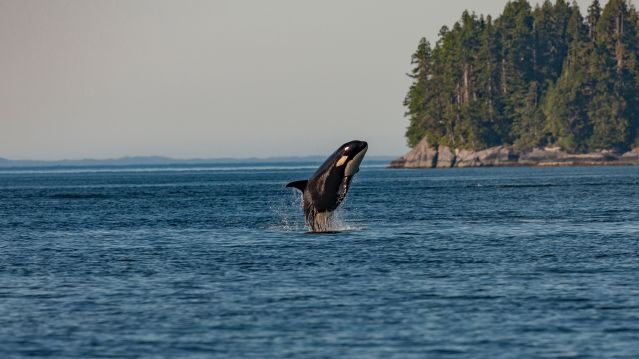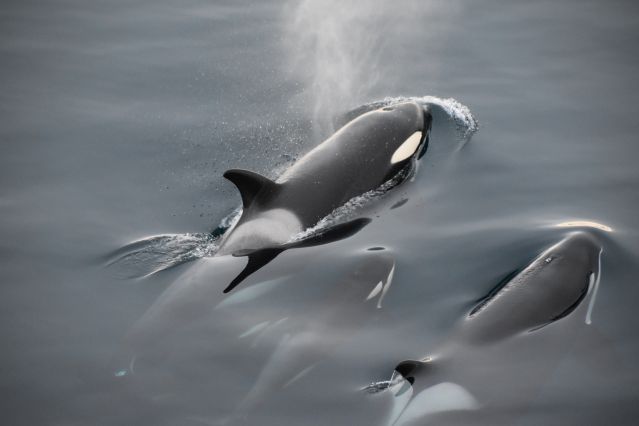Animal Behavior
Orca-strated Chaos: Understanding a Summer of Orca Drama
Boat bashing, porpoise bothering, newborn stealing (or saving). What's going on?
Posted October 31, 2023 Reviewed by Abigail Fagan
Key points
- In 2023, whales have been seen boat-ramming, harassing other species, and adopting (or kidnapping).
- These behaviours may be underpinned by social learning and helping, traits that humans are good at.
- Complex social lives and dependence on others for survival may be why humans and orcas exhibit these traits.
You’ve probably heard about orcas ramming into boats in the Strait of Gibraltar this summer. Not only did this boat-ramming behaviour make international news, but it also trended on Twitter and became meme-ified.
Orcas didn’t begin this behaviour this year. In fact, they have been ramming into boats off the Spanish and Portuguese coasts since 2020. But with the sinking of three boats, and the apparent spread of the behaviour from Spain to Scotland, people started paying attention. In particular, people wanted to know why orcas are doing this.
Meanwhile, on the other side of the world, scientists were trying to understand another odd orca behaviour. In the Pacific Northwest, a fish-eating orca population have been observed harassing – and sometimes killing – porpoises. This would be no strange thing if the orcas ate the porpoises, but they do not. So, what exactly are they doing?
To add to this summer of oddities, scientists in Iceland spotted a newborn pilot whale swimming alongside an adult female orca. This is the third year in a row that a newborn pilot whale has been spotted with an orca in Iceland. But we don’t know whether these newborn pilot whales were rescued by the orcas, or if they were kidnapped.

What’s behind this orca-strated chaos?
The answer is that we currently don’t know. However, scientists have put forward their leading theories. Interestingly, even though the events above seem unrelated, it is likely that they are underpinned by the same behaviours; behaviours that are commonly seen in another species – us.
Learning from others is something that humans are masters of. From a young age, we start paying attention to what others are doing, and we copy them. But we’re not the only animals who do this – not by a long stretch. Many social species learn from their groupmates, including rodents, monkeys, birds and whales.
While social learning often helps animals survive – for example, because they can learn from their groupmates how to find food or build shelter – sometimes, there doesn’t seem to be an obvious function to the behaviour. These behaviours can be thought of as ‘trends’ or ‘fads’.
In humans, this happens all the time. Think of fashion, makeup, and playground games, and how they spread rapidly throughout our social circles before disappearing again. We have a few examples of such ‘fads’ in non-humans, too. For example, Japanese macaques engage in ‘stone handling’, where they collect, carry and handle stones (see video below), and they seem to pick this up from their groupmates. In another example, an individual orca started wearing a dead salmon as a hat. The behaviour soon spread throughout her pod, and then to individuals in neighbouring pods.
Orca boat-ramming behaviour also seems to be socially learned. We don’t know for sure who started the behaviour, and we don’t know why, but – to date – eleven juveniles and four adults have been seen to participate. Most likely, it’s a form of play behaviour that is ‘trending’ in orca society – they see one another doing it and they jump aboard (sorry), and so it spreads through the group.
Similarly, scientists looking into orcas' harassment of porpoises suggest that it is likely to spread through social learning. It started off in one pod, and then spread to two others. And again, it appears to have no direct benefit. Across 78 observed harassment events (36% of which probably ended in the death of the porpoise), the whales were never once observed eating the porpoise. As with the boat-ramming behaviour, it may just be a fun orca ‘trend’ (albeit, not a very fun one for the porpoises).
However, there is another explanation for why orcas harass porpoises, and it could also explain the strange ‘adoption’ or ‘kidnapping’ behaviour observed in Iceland this summer.
Epimeletic (helping) behaviour
This is where an adult helps a distressed or injured individual by staying near it and protecting it from danger. Humans are prime examples of this. We tend to protect and take care of those that need help.
In the case of porpoise harassment, it may be the case that the orcas are actually trying to ‘mother’ the animals, through displaced epimeletic behaviour. Unfortunately, porpoises are very small relative to orcas, and so, when an orca decides it wants to ‘help’ it, for example by carrying it or holding it above water, it might actually be quite dangerous for them.
Epimeletic behaviour may also explain why newborn pilot whales have been spotted with adult orcas. Scientists suggest that the adult orcas may be treating the newborn pilot whales as their own young. Indeed, the newborns have been observed swimming in exactly the same way as newborn orca, in a position that is energetically intensive for the adult but helps to conserve the baby’s energy. There is still a lot we don't know about these encounters, though, and there are some alternative explanations for what is going on. We also do not know how the orcas get these newborn pilot whales in the first place. Do they find them alone, or do they kidnap them?
Social learning, play and helping: why do they do it, and why do we?
It’s been a summer of strange orca behaviour, and some of their behaviour may seem less than appealing to human onlookers. But it would be hypocritical of us to judge them for it. Afterall, these behaviours — social learning, playing and helping — are behaviours that we often, incorrectly, think of as unique to ourselves.
An interesting question is why these similarities exist. Well, we are both super social species, with big brains, long lives, complicated social structures, and the need to form strong bonds with others in order to survive. It's therefore no surprise that we see three behaviours that are intrinsic to social living — learning from one another, engaging in play, and helping those in distress — in both ourselves and in orcas.
Rather than villainising them (which has happened quite a lot this summer), we should be fascinated by these animals, their behaviours, their parallels and their differences to us. These 'odd' behaviours should be fuelling our fascination with them, our drive to learn more about them, and our motivation to keep them safe.





